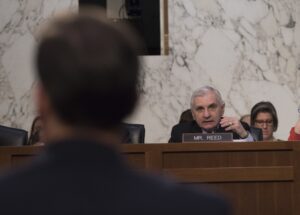A pair of senior House Armed Services Committee members suggested on Tuesday that finalizing the fiscal year 2024 National Defense Authorization Act (NDAA) will likely be done without a formal conference negotiation with the Senate, due to a delay in initiating the process.
While the House has moved to begin conferencing on the NDAA and named its negotiators, the Senate has yet to do so and differences between the two current versions of the defense policy bill will now likely have to be settled by passing the legislation between the two chambers.

“Just from a timeframe and how the Senate operates, if they don’t assign and go to conference by the end of this week, it makes it incredibly difficult to get [NDAA negotiations] done before the end of the year without the ping pong,” Rep. Rob Wittman (R-Va.), chair of HASC’s Tactical Air and Land Forces Subcommittee, said at the Politico Defense Summit in Washington, D.C., on Tuesday.
The “ping pong” process Wittman referred would involve the leaders of HASC and the Senate Armed Services Committee meeting to settle major differences between the two chambers’ bills and present a negotiated final NDAA, which the House, for example, could amend and send to the Senate, which if amended again would be sent back to the House.
Typically, a group of House and Senate lawmakers meet for formal negotiations to settle on a final conferenced agreement for the bill that includes compromises and priorities from both sides and is then taken up by the two chambers.
Rep. Joe Courtney (D-Conn.), the top Democrat on HASC’s Seapower Subcommittee, noted on Tuesday that HASC’s staff has been working on NDAA conference items for the last two months to prepare for the negotiation process to finalize the legislation.
“I think there’s been a real narrowing of the issues that need to sort of get flushed out. I think we would prefer doing it the old-fashioned way like Schoolhouse Rock, where the two sides conference. But the last two years, we did do a ping pong and successfully got the bill across the finish line,” Courtney said.
The House named its NDAA conference negotiators in September, with HASC Chair Mike Rogers (R-Ala.) last week urging the Senate to do the same and begin the process.
“For the first time in two years, we have the opportunity to return to regular order and hold a conference to work out the differences between the House and Senate bills. Unfortunately, for over seven weeks, the Senate has refused to agree to a conference and name their conferees. It’s vital that Congress come together to enact an NDAA that will build the ready, capable, and lethal fighting force we need to defend our nation. The House is ready to get to work – I urge the Senate to join us,” Rogers said in a statement.
The House narrowly passed its $886 billion version of the NDAA in mid-July with a 219-210 vote, which followed days of debate over Republican proposals that included adopting measures along party lines to reverse Pentagon policies on abortion and block diversity programs (Defense Daily, July 14).
Democrat leaders on HASC, including Ranking Member Adam Smith (D-Wash.), denounced the typically bipartisan legislation that they said was now “an ode to bigotry and ignorance.”
In late July, the Senate voted 86-11 to pass its own $886 billion version of the bill, which followed a much less contentious debate than compared to the House’s process (Defense Daily, July 28).
“What is happening in the Senate is a stark contrast from the partisan race to the bottom we saw in the House, where House Republicans are pushing partisan legislation that has zero chance of passing,” Senate Majority Leader Schumer (D-N.Y.) said during floor remarks at the time.
New House Speaker Mike Johnson (R-La.) has previously stated that he would like to pass a final version of the FY ‘24 NDAA in December (Defense Daily, Oct. 25).
Wittman said on Tuesday that Johnson, who served on HASC, is “committed to making sure we get the NDAA done.”
“I do know that he understands what he has to balance there in the interest of the entire conference as well as, you know, what has to be done in order to get it through not just the House but the Senate. But I think he’s focused on making sure that we get it done in a form that gets as many votes on our side of the aisle as possible,” Wittman said.